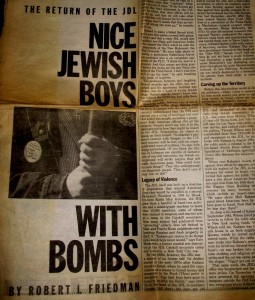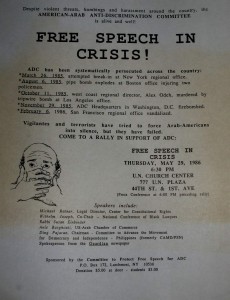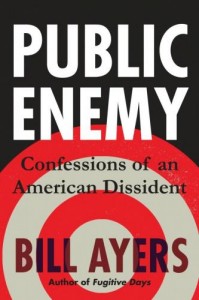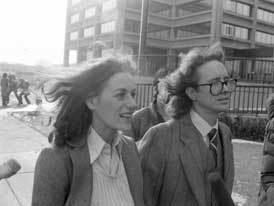Podcast: Play in new window | Download
Updates:
- Socialist Wins Seat on Seattle City Council
—–
Alex Odeh Case – Abdeen Jabara
On October 11, 1985, prominent Palestinian-American leader Alex Odeh was killed by a pipe bomb at the offices of the American-Arab Anti-Discrimination Committee, where he worked as the group’s western regional director in Santa Ana, California. Now, the FBI and Justice Department are being urged to renew its investigation into this shocking political murder. history.
Very quickly, the FBI named the militant Jewish Defense League, or JDL, as a focus of its investigations. Yet, more than two decades later, no one has been questioned or indicted for Odeh’s murder. Today we welcome back civil rights attorney Abdeen Jabara who helped found the American-Arab Anti-Discrimination Committee. He joins us to talk more about the reopening of this political murder investigation 28 years later.
- The FBI says the case has not been closed and its an ongoing investigation.
- We’re talking about 28 years after the fact.
- Congresswoman Sanchez from Orange County, California from the 46th district wrote a letter to Eric Holder and to the FBI requesting some closure on this case and she got back a very unsatisfactory reply.
- She has joined with several other Congress people, John Conyers of Michigan and others to ask for hearings in the Judiciary Committee of the House on this case.
- There have been many ups and downs in the case since Alex was killed.
- Several people have been arrested in the case but not for the assassination of Alex Odeh.
- The JDL was created in 1968 by Meir Kahane.
- Chairman of our organization, Jim Abarez was contacted by the FBI and was told that he, myself and two other individuals were placed on a hit list by the Jewish Defense Organization.
- Prior to the killing of Alex Odeh, there were a number of incidences. We had our regional office in Boston burned. We had attacks here at our office in New York City. A number of telegrams, threatening calls, all types of harassment was occurring on a daily basis and then Alex Odeh was killed.
- He left 3 beautiful daughters and a widow in Orange County and they are active to this day and his brother is active in trying to maintain the pressure to keep this case alive and bring justice about.
- The Israeli government has not been cooperative with this FBI investigation.
- The fact of the matter is that Arab-Americans have little or no political power in this country.
- I think there is a possibility of movement and we need to have people contact Eric Holder’s office. The FBI is part of the Justice Department, the FBI is responsible for investigating these cases.
Guest – Attorney Abdeen Jabara, co-founder of the American-Arab Anti-Discrimination Committee.
——
Public Enemy: Confessions Of An American Dissident
A sequel to Fugitive Days, Public Enemy: Confessions of An American Dissident chronicles Bill Ayers life after the Weather Underground. Since his memoir Fugtive Days was published September 10, 2001 about his life in Students for a Democratic Society and later the Weather Underground, Ayers was under attack by right wing media which tied him to the catastrophes of 9/11 based on a New York Times interview quote. Bill Ayers became famous in the early 1970s as a leader of the Weather Underground; he is known to have participated in the bombings of New York City Police Department headquarters in 1970, the US Capitol building in 1971, and the Pentagon in 1972. He surfaced in the mid-1970s, when the government charges against him were dismissed for prosecutorial misconduct.
His new book Public Enemy starts during the 2008 presidential debate in which his neighbor Barack Obama in the Hyde Park community of Chicago was confronted about their association. The book also describes how Ayers and his wife Bernadine Dohrn rebuilt their lives as public figures. Ayers became a professor of education at the Chicago campus of the University of Illinois.
- The American dissident part came pretty naturally. I grew up in the heat of the civil rights movement.
- I came of age when the world was on fire.
- In our own country it was the black freedom movement finding the moral agenda for the whole nation and I found myself drawn inexorably into it.
- The public enemy part comes from continuing to live a long life as a radical, and as a public radical and not being willing to trim my sails or my revolutionary hope stream spirit.
- Come the 2008 election, the national election. I was thrown unwittingly, unwillingly into that national campaign.
- The narrative that Barack Obama palled around with terrorists, that Barack Obama had a shady Palestinian friend or the narrative that he hung around with a black nationalist preacher, that narrative was spun by Hilliary Clinton long before Palin and McCain picked it up.
- The ole American favorite past time, guilt by association, that’s how I became a public enemy.
- I was a kid coming out of a privileged background. I went to the University of Michigan and I couldn’t sleep for about 2 years because the world was on fire.
- I was arrested opposing the war in Vietnam. I spent ten days in county jail and there I met a man whose wife just founded a freedom school.
- I marched out of jail into my first teaching job. For me teaching was always linked deeply with the quest for social justice. I returned to teaching in 1978, after our first child was born.
- The ideal is that every human being is of incalculable value in a country that found on the idea that we are all equal.
- What we ought to be demanding is an educational system that creates free people, people with minds of their own, people who are able to interrogate the world before them.
- In Nazi, Germany, they had wonderful schools that taught amazing literature and music, arts and so on, and they also had a system based on obedience and conformity and doing what you’re told and following the rules. That’s a recipe for catastrophe in any free society.
- What I’ve spent most of my adult life doing is fighting for an educational system where the fullest development of each becomes the condition for the full development of all and the fullest development of all becomes the condition for the full development of each.
- Who are you? How did you get here? Why are you in the freedom movement? What are you trying to accomplish and where do you want to go? The message of those questions are revolutionary.
- The Highlander Folk School
- We don’t have a king that can save us. We are sovereign.
- Those of us who still think of ourselves as revolutionaries living in difficult times, dark times, have to find ways to become movement builders. Movement building is on the agenda. Bringing those together who are working in various fields to change the frame of the discussion.
Guest – William Ayers, Distinguished Professor of Education and Senior Bill Ayers University Scholar at the University of Illinois at Chicago (retired), member of the executive committee of the Faculty Senate and founder of both the Small Schools Workshop and the Center for Youth and Society, taught courses in interpretive and qualitative research, oral history, creative non-fiction, urban school change, and teaching and the modern predicament. A graduate of the University of Michigan, the Bank Street College of Education, Bennington College, and Teachers College, Columbia University, Ayers has written extensively about social justice, democracy and education, the cultural contexts of schooling, and teaching as an essentially intellectual, ethical, and political enterprise.
——————————————————————–



